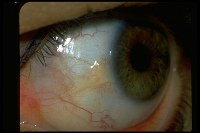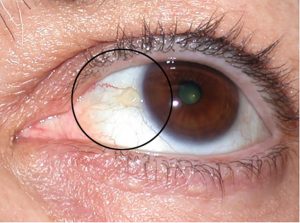
Pinguecula is a common skin condition, affecting around 2% of the population. It’s more common in males and is probably caused by long-term occupational exposure to ultraviolet rays and sunlight. By the time an individual reaches his or her 80s, almost all of them will show signs of the condition. Although there’s no specific treatment for pinguecula, a doctor can give you some tips to relieve your discomfort and improve your quality of life.
Pinguecula is a benign degeneration of the conjunctiva that appears as a raised yellowish patch on the bulbar conjunctiva. The cornea is the transparent layer that covers the pupil and the iris, which is colored. Most pingueculae appear on the side of the cornea that faces the nose, though they may grow on the opposite side of the cornea. The growth rate of pingueculae can vary considerably, so it’s important to consult with your eye doctor about your specific condition.
Symptoms of pinguecula are mild and temporary. They often do not cause any pain or discomfort, but in extreme cases you may need to seek treatment. To relieve the symptoms of pinguecula, you can apply artificial tears or use eye drops that moisten the eyes. Your eye doctor may also prescribe steroid eye drops and anti-inflammatory medications. A healthcare professional will conduct an examination to diagnose the cause of the disease.
Unlike cataracts, pinguecula does not require treatment. Most people will eventually grow themselves. Your doctor may remove them if they become too large. If you think you have pinguecula, you should see your doctor as soon as possible. They will be able to determine the correct course of treatment. If you suspect this condition, you can try to treat it yourself.
The symptoms of pinguecula are not related to the pinguecula itself. However, you may experience itching, burning, or sensitivity to light. It is not the pinguecula itself, but the symptoms it causes are caused by the formation of the pinguecula. If you have pinguecula, you may experience blurred vision. Fortunately, this is rare. If you have pingueculo, it is harmless and does not affect your vision.

Despite its unpleasant appearance, pinguecula is not a serious disease. If you have pinguecula, you should see your doctor immediately and visit the site https://www.goldensoft.co.th/. This is a common eye problem, but it is not a life-threatening condition. If you have pingueculitis, it is important to start treatment as soon as possible. Your eye health and vision are at risk, so you should take action as soon as possible.
Symptoms of pinguecula are usually not serious, but you may experience irritation. You should see a doctor as soon as you notice a pinguecula. It is important to protect yourself from the sun. This will prevent it from growing and also make it easier to wear sunglasses. If you do not have pinguecula, it is recommended to wear sunglasses with a UV filter.
A pinguecula can appear as a small, yellowish bump on your eye. It’s best to keep your eyes protected from direct sunlight if you have it. If you’re exposed to the sun a lot, it can damage your eye. The first thing to do is to wear sunglasses and a hat to protect your eyes from the harmful ultraviolet light. It’s also helpful to wear a hat when outside.
A pinguecula can be quite painful, but most people don’t experience any pain or discomfort from it. The condition is generally harmless. It may just be an annoying bump on the eye that causes a foreign body sensation. Most people with pinguecula are unaware of it, but it’s important to consult a doctor if you have an uncomfortable pinguecula. You may also be able to get prescription eye drops to relieve the pain and inflammation of the eye.
A pinguecula is similar to pterygium, but is not dangerous. It’s not harmful to your vision, but it can cause irritation. If left untreated, it can be painful and affect your vision. You can take steps to reduce your risk of this eye condition. Once you have a pinguecula, it’s important to avoid exposure to the sun as much as possible. If you have a pterygium, it’s essential to seek medical attention to prevent it.